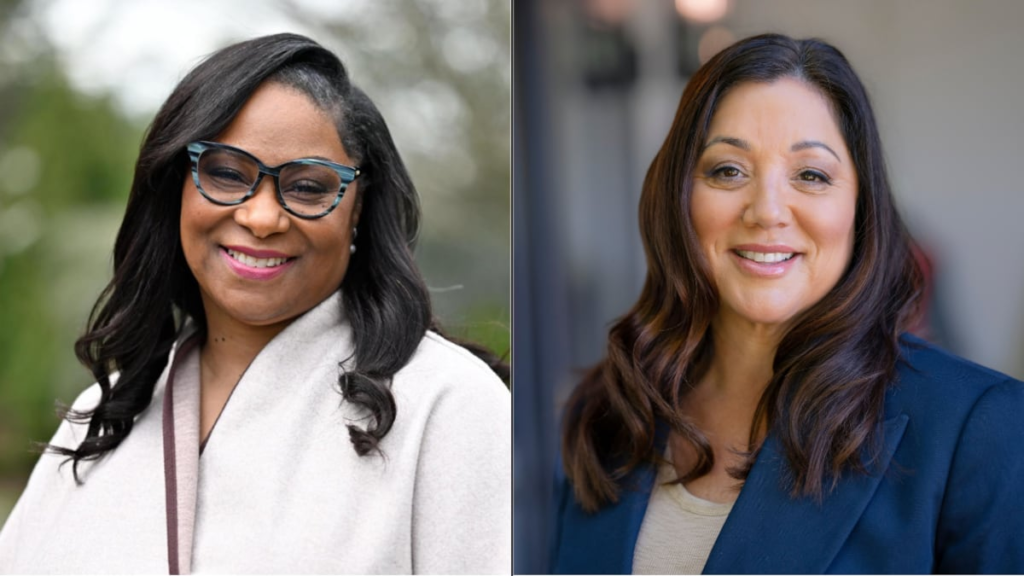Editor’s note: Election Day is Tuesday, Nov. 5. Stay informed with OPB on the presidential race, key congressional battles and other local contests and ballot measures in Oregon and Southwest Washington at opb.org/elections.
Candidates for Oregon’s 5th Congressional District, state Rep. Janelle Bynum (left) and U.S. Rep. Lori Chavez-DeRemer (right).
Courtesy of the campaigns
If you live in Oregon, you’re probably wondering when you’ll stop seeing all the commercials and attack ads about state Rep. Janelle Bynum and U.S. Rep. Lori Chavez-DeRemer.
Well, you have just under three weeks left.
The high-profile matchup for Oregon’s 5th Congressional District is in its final stages, raking in millions of dollars in campaign contributions and the backing of some of the nation’s most powerful politicians. The balance of power in Congress may be at stake.
Related: What you need to know about voting in Oregon and Southwest Washington
“We have a race in Oregon that could potentially tip control of the U.S. House of Representatives,” said Chris Shortell, a political science professor at Portland State University. “That’s a tremendously influential position to be in.”
The candidates have some things in common: They’re moms, women of color, longtime public servants and residents of Happy Valley in Clackamas County, the district’s most populous area. And they know each other well — at least politically. They have faced off twice before in Oregon House races. Bynum won each time.
This time, however, the political battleground is different. Chavez-DeRemer narrowly won the last congressional election against Democrat Jamie McLeod-Skinner, flipping a district that President Joe Biden won in 2020.
Two polls have shown the race is neck-and-neck, but some experts say that having Vice President Kamala Harris at the top of the ticket could boost turnout among Democrats and improve Bynum’s chances. Still, the nonpartisan Cook Political Report calls the race a “tossup.”
Related: Issues important to Oregon voters
“It’s one of the top five most targeted seats for the (Democrats) to flip,” said Shawn Cleave, the owner and lead lobbyist at Cleave Government Affairs, who previously served as a senior advisor to top Republicans like former House Republican Leader Mike McLane in the Oregon Legislature.
More than 543,000 registered voters live in the district, which spans from the Portland suburbs through the mid-Willamette Valley and over the Cascade Mountains to the high desert. Of those, about 31% are Democrats, 27% are Republicans and 34% are non-affiliated voters. Much of the rest are from other groups like the Independent party or Libertarian, according to state registration data as of October.
At this point, registered Democrats and Republicans aren’t likely to ditch their nominees. So, much like this year’s presidential election, the race is becoming a fight for the “swing voter,” that seemingly indefinable person who could go with either party’s candidate. And the candidates seem well aware of that, touting their bipartisanship in debates and advertisements while portraying their opponent as politically extreme.
Related: Listen to ‘OPB Politics Now’
“We live in a 49-51 world, and it can be swayed by that small number of people that are a wild card,” said Tony DeBone, a commissioner in Deschutes County, which has recently changed from being reliably red to having more Democrats and non-affiliated voters.
Financially, Bynum is winning. She has more than $5.8 million in total contributions, with $3.4 million coming in July through September, outraising Chavez-DeRemer’s more than $4.4 million total and $1.1 million in that same time frame, according to Federal Election Commission filings published this week.
Janelle Bynum, candidate in the 2024 Democratic Primary for Oregon’s 5th Congressional District, in this undated image provided by the campaign.
Courtesy of the campaign
Now the race is devolving into a bare-knuckles brawl featuring a dizzying array of often misleading accusations against either candidate. In other words, it’s a classic example of today’s congressional politics, love it or hate it.
Chavez-DeRemer fights to stay in Congress
Like Republicans across the country, Chavez-DeRemer has used immigration reform as a major part of her campaign strategy, calling for border security to prevent addiction and crime. But, as she acknowledged to OPB, immigration is “personal to me because my great-grandmother’s family left Mexico and entered the United States legally to pursue the American Dream.”
Raised in Hanford in California’s agriculture-rich Central Valley, Chavez-DeRemer learned about this family history from her grandmother, who never had more than a sixth grade education and worked in the fields to support the family, she said.
She acknowledged that immigration is critical to her district, adding that Hispanic residents are part of the “fabric of this state,” make up about 14% of her district’s population and prop up the agriculture industry. A member of the Congressional Hispanic Conference, she added, “We are a proud nation of immigrants.”
“I think what we’re experiencing now is something that we have to stay focused on: making sure that the American dream will always be available, but at the same time knowing who’s coming across that southern border,” she said in an interview.
Chavez-DeRemer is the mother of twin girls. According to her website, she and her husband founded an anesthesia management company and “opened several other medical clinics in the Pacific Northwest.”
Before Congress, Chavez-DeRemer served the city of Happy Valley, first as a member of the local parks committee in 2002 and later on the city council. She was elected mayor in 2010 and reelected in 2014 before becoming Oregon’s first Republican woman elected to Congress.
Supplied images of Republican U.S. Rep. Lori Chavez-DeRemer, who is running for Oregon’s 5th Congressional District position in November, 2024.
Courtesy of the campaign
Rather than national politics, Chavez-DeRemer has focused much of her message on local efforts and issues, like her opposition of tolling on Interstate 205. She points to her efforts to secure $500 million for the Portland Veterans Affairs Medical Center and $27 million for local infrastructure and public safety projects, including the Bend Municipal Airport and Clackamas County’s emergency dispatch center.
“She gives me confidence that she’s really looking out for the CD-5 residents,” said DeBone, the commissioner. He’s one of 10 county commissioners who have endorsed Chavez-DeRemer. “I think she’s going to be even more valuable right now, because she does have those first two years under her (belt),” he added.
Despite Bynum’s efforts to portray Chavez-DeRemer as a “MAGA extremist” for endorsing former President Donald Trump, the first-term representative has repeatedly said that she is the second most bipartisan member of the House of Representatives. In May, the Lugar Center and Georgetown University’s McCourt School of Public Policy ranked her the 29th.
Asked by OPB who won the 2020 election, she wrote, “Joe Biden,” and nothing further. She says she signed a bipartisan pledge to accept and certify the final election results and support the peaceful transition of power. She said she would oppose a federal abortion ban and supports IVF and mifepristone, adding: “I’m not pro-choice enough for the left, and I’m not pro-choice enough for the right, and then I’m right down the middle, which is where most Americans are.”
“Here in Oregon, 65% of Oregonians have said they want access to abortion,” she said in an interview with OPB. “It is now a state’s rights issue, per the Supreme Court ruling … I am never going to fundamentally get in the way of access to abortion for Oregonians. I’ve said it more than once, and I’ll continue to say it throughout my time in Congress. That’s my promise.”
But Bynum has accused Chavez-DeRemer of having flip-flopped on abortion, noting in a debate last week that Chavez-DeRemer supported the Heartbeat Protection Act of 2023, which would ban abortion after six weeks of pregnancy.
Chavez-DeRemer called that an “outright lie” and said she hadn’t voted on the heartbeat bill, but she tweeted in 2022: “A vast majority of Americans want restrictions on abortion and I would be in favor of passing legislation like the heartbeat bill.”
When asked about the accusation that she has shifted her stance on abortion, Chavez-DeRemer said: “That’s nonsense.”
Chavez-DeRemer has the backing of the state’s top Republican leaders, as well as a slew of public safety and labor officials and groups, like the Oregon Coalition of Police & Sheriffs and the United Food and Commercial Workers Union.
Since late August, outside groups have spent nearly $2.4 million supporting Chavez-DeRemer’s campaign. The political action committees come from the National Association of Realtors, the National Rifle Association, Fairshake, a super PAC bankrolled by top cryptocurrency companies, and a group called the American Association of Nurse Anesthetists, according to federal filings.
And she’s had to contend with $4.3 million being spent to oppose her campaign. Among the groups pushing back are two entities dedicated to electing House Democrats, the Pro-Choice Majority 2024, the League of Conservation Voters Victory Fund.
Cleave, the longtime lobbyist, compared Chavez-DeRemer’s moderate stance to that of the district’s former congressman, Kurt Schrader, a blue-dog Democrat who served from 2009 to 2023. Cleave added, “CD5 is a perfect district for somebody like Lori.”
He has his doubts that the presidential race will sway Oregon voters enough to make a difference in this race.
“I don’t see any party benefiting from a wave at the top of a ticket,” Cleave said, adding: “I think Lori pulls it off.”
Bynum would be Oregon’s first Black member of Congress
If Bynum is elected, it would be a milestone: She would be Oregon’s first Black member of Congress.
“Of course it’s historic,” said Portland Sen. Lew Frederick, who recalled being one of two people of color in the Legislature when he was elected in 2009.
Bynum was born in Washington, D.C., “one generation removed from segregation,” she said. Her parents were teachers, her mother graduated from an all-Black high school in South Carolina.
“When she graduated, there was nothing waiting for her,” Bynum said of her mother in an interview with OPB. “There was not like a college scholarship. There was not a great job for this kid who graduated at the top of their class … What it reminds me of is this gap between talent and opportunity and how that translates to this race.”
Bynum came to Oregon after September 11, 2001, to be closer to her husband’s family. She’s an engineer who owns four McDonald’s fast-food restaurants. She has four kids, ages 14 to 22. She used to struggle to balance her political and family life, she said, but now, she often speaks about them in her public appearances and debates.
“The more I actually started leaning into my experience as a mother, and my experience of seeing the world through their eyes and my experience of being a parent … I started to accept that much more as the reality of what the Legislature and lawmaking bodies needed,” she said.
Bynum acknowledges that she has faced the realities of being Black in the suburbs of one of America’s whitest major cities, and so have her children. During her 2018 state house campaign, someone called the police on her while she was knocking on doors in Clackamas County. A sheriff’s deputy showed up and said she had been reported as “suspicious.” The story made national headlines.
Her colleagues in the Legislature describe Bynum as driven and singularly focused, having once made a run for the top role as Oregon House speaker. She helped pass bills aimed at boosting the local semiconductor industry.
As the racial justice uprising swept Portland in 2020, she was at the center of Oregon’s debate around police reform in the aftermath of the police murder of George Floyd, serving as chair of the House Judiciary Committee and helping pass bills aimed at holding police accountable.
“It was a very difficult time to navigate and keep things from blowing up, and I believe I deserve credit for navigating that in a way that kept everyone at the table,” she said.
Chavez-DeRemer has seized on this as an example of how Bynum is soft on crime, accusing her opponent of dismantling police power and blaming her and other top Oregon Democrats for the state’s fentanyl crisis and the failure of Measure 110, the state’s drug decriminalization law. In a recent debate, the two disagreed on whether the police reform bills Bynum supported truly passed with bipartisan support.
Ron Noble, a former Republican representative who served alongside Bynum as the committee’s vice chair, took issue with her characterization that he rubber-stamped the police reform package.
“She painted the picture that we were skipping through the forest and holding hands and everything was great. I would characterize it as hardball,” said Noble, a former McMinnville police chief.
“If you look at what other states were doing at the time, Oregon actually tackled a lot of tough things, so I mean, it wasn’t all negative,” he said. “There were some things that we were able to do to take a system we thought that worked pretty good and make it better.”
Most recently, Fox News reported on a complaint and text messages alleging Bynum brushed off a report of sexual harassment and assault of a minor by a “field organizer” to her 2022 legislative campaign.
The July 15 complaint to the Oregon Legislative Equity Office, which OPB reviewed, was made by Kelie McWilliams, who served as campaign manager for Bynum’s opponent in the May Democratic primary, Jamie McLeod-Skinner. The complaint lacks specific details about the alleged assault, including when it happened or who the victim was.
Bynum’s campaign provided an email to news outlets, including OPB, in which Legislative Equity Officer Bor Yang told Bynum she was “not being investigated by the Legislative Equity Office.” She said she reported the issue to the employer of the accused, FuturePAC, the House Democratic caucus’ campaign arm.
Still, Republican leaders, like former House Republican Leader Christine Drazan, called it “a political coverup of potential criminal misconduct.”
“I take this seriously, and that’s why I openly aided the legislative equity office’s investigation in the matter,” Bynum told OPB. “And I have every expectation that Future PAC would deal with those accusations fairly and swiftly. And so I’ve said repeatedly that if they did anything less that’s unacceptable.”
Bynum didn’t elaborate when pressed for further details about what evidence had been reported to her.
“It’s a distraction. It’s a smear attempt. I believe that I did everything that I was supposed to do,” she said.
Since September, Bynum has been buoyed by more than $1.5 million in advertisements supporting her campaign, largely from PACs that support Democratic candidates for the U.S. House of Representatives. Meanwhile, Republican groups have spent more than $4 million opposing her campaign.
Bynum has been endorsed by most of Oregon’s top Democrats, including Gov. Tina Kotek, as well as labor groups like AFL-CIO Oregon, which represents over 300,000 working Oregonians, including nurses, firefighters, teachers and more. Sen. Frederick says Bynum has been a determined and effective member of the Legislature and that she’s the person Oregon needs in Congress.
“Because she’s an African American, she’s going to bring a perspective that is different than what we’ve seen from a lot of places because she has understood the kind of barriers and other things that anyone who’s African American has to deal with,” he said.



